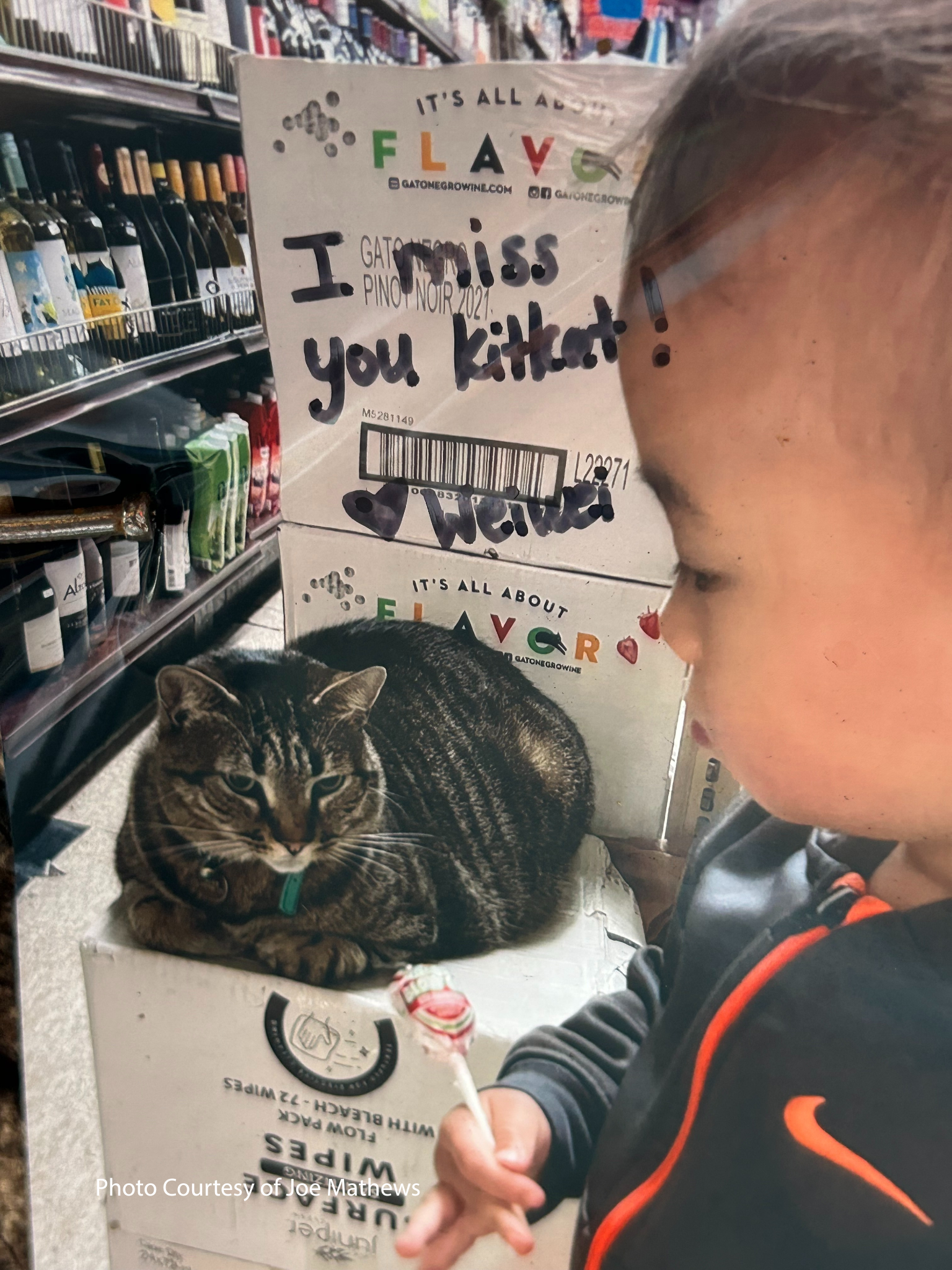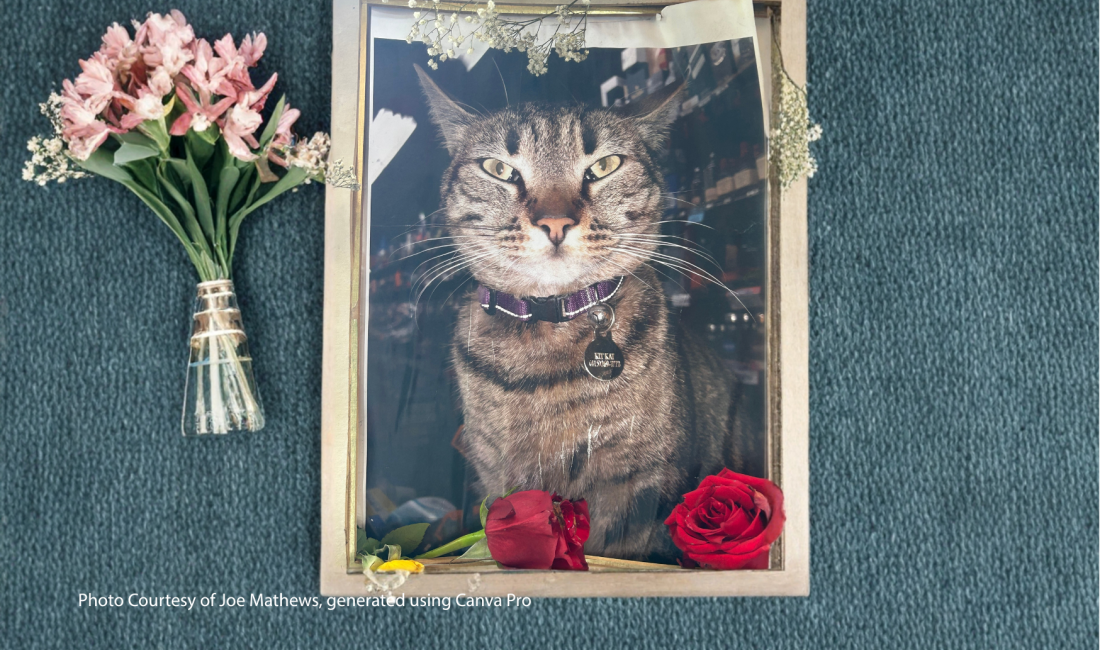KitKat Was Killed by a Waymo Robotaxi. But He Lives On.
By KITKAT, as told to Joe Mathews
“Funny, how gentle people get with you once you’re dead.”
Sunset Boulevard
Admit it. You didn’t care about me until I lost my ninth life.
Heck, unless you were from the Mission, you never even heard of me until the news that an autonomous-driving Waymo ran me over one dark Monday night. And you never once considered what it was like to be me—not until I went from being just another crazy San Francisco cat to a global symbol.
I wonder even now, writing from Cat Heaven (where all the mice are slow and all the milk is rich and creamy), whether you really understand me.
I, for those of you who haven’t looked at social media lately, was a male brown tabby who lived at Randa’s Market and patrolled my small section of San Francisco so well that neighbors called me “the mayor of 16th Street.” For the record, I was never elected to that post, unlike other cat mayors, including the political giant Stubbs in Talkeetna, Alaska, or the reformer Barsik, who led the polls in Barnaul, Siberia, before Putinists who opposed his anti-corruption platform blocked him from taking office.
Cats make great local leaders because we’re natural protectors with strong territorial instincts, mice-killing talents (we do it for public health, I swear) and possess the ability to form deep bonds with people. During my tenure, I comforted the unhoused and helped my neighborhood survive the pandemic and London Breed’s six years as mayor. And I was still on the street, serving the public, when a Waymo robot taxi crushed me to death.
Within hours, news of my demise dominated headlines and social media in California. Within days, I was an international martyr.
My image appeared as far away as India, with my death treated less like a road casualty than a political assassination.
Why the outpouring? Not because you humans care about animals or our traffic-related deaths. You callously tolerate a holocaust—365 million road deaths of vertebrates a year, according to one estimate.
No, this reaction was all about you and your fears of non-human intelligence. Waymos are autonomous vehicles that make life-and-death judgments based on artificial intelligence. And Waymo is a titan of the tech industry that is pursuing the AI future relentlessly, despite profound concerns about the impact on human jobs and lives.
Plus, we cats are famous for surviving impossibly tough situations. Unsinkable Sam famously stayed alive through the sinking of three ships during World War II.
When you saw the news about me, you all certainly were thinking:
“If a Waymo can take all nine of KitKat’s lives in one roll of the tyre, what chance do we have?”
Just hours before I died, eerily, Waymo’s CEO proclaimed at a TechCrunch event that autonomous vehicles will kill people, and society will accept it. The company’s subsequent response to my killing hasn’t soothed fears. Waymo took three days to acknowledge its role in my death, and offered an account of me “darting under” the robotaxi that conflicted with witness statements. Also, Waymo, as of this writing, hasn’t released any video its vehicle may have captured of my death.
Is there a cover-up underway?
It hasn’t helped that Silicon Valley leaders, drunk on AI investment, have met my death with shrugs, with Elon Musk claiming AI and autonomous vehicles will prove to be lifesavers. I couldn’t help noticing that the U.S. government didn’t even bother to send thoughts and prayers. Do you think that’s because I have darker fur? After all, it’s now federal policy that the authorities are free to harm anyone on California streets who is Brown.
The state of California has likewise shown little remorse or reaction. Two weeks after I was killed, the state’s Public Utilities Commission—which regulates autonomous vehicles when it’s not raising electricity rates to save utilities from the costs of the deadly fires they start—let Waymo extend its service to freeways in San Francisco and Los Angeles.
Yes, the state legislature and governor did just enact a pioneering law on “frontier artificial intelligence. But California has actively blocked efforts by cities and local governments to regulate AI. Last year, a state bill to allow local permitting for autonomous vehicles was shelved. And that dog Gavin Newsom keeps vetoing common-sense bills to require humans in autonomous trucks, and better reporting of autonomous vehicle accidents.
This dead mayor believes, since cats feel the impact of autonomous technologies in the neighborhoods where they live, that AI regulation should be local. My idea isn’t radical. Cities from Singapore and Helsinki to Curitiba, Brazil, have AI regulations in place. The Cities Coalition for Digital Rights, with leadership from Toronto and New York, is developing a local governance framework for AI.
My hometown should be a leader, not a laggard, in this space, which is why it’s good that my death inspired a proposal to let San Francisco voters decide whether to limit autonomous vehicles. If local restrictions create a patchwork of regulations that force tech companies to slow down on AI, so much the better.
My death is proof of how AI now shapes our lives, and without our democratic consent. We cats, of course, are barred from voting. And no one asked my human constituents if they wanted Waymo on 16th Street. The fact that AI companies are cozying up to tyrant Trump shows just how anti-democratic this technology has become.
Closer to home, it doesn’t help that Mayor Daniel Lurie, a tech establishment poodle, is no friend of animals. Just days after my death, he appointed the owner of a pet shop that “smelled like death” to an open seat on the San Francisco board of supervisors.
Public outcry forced her quick resignation. That’s a start.
But if the mayor doesn’t take the city back from the tech folks, he might face a tough re-election challenger: me.
I may be dead, but I’m not done. And I’m the most popular cat in town.





